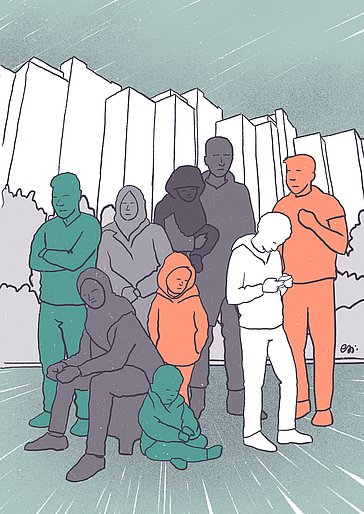
NORTHERN IRAQ
Back instead of alone in asylum
Yousif Salman: Northern Iraq – Turkey – ... – Germany – Northern Iraq (– Germany?)
“Be it legally or illegally, the main thing is to get back to Germany.” This is how Yousif Salman* described his plans right at the beginning of the interview. He is a Christian and was living with his family in the northern Iraqi province of Nineveh between Mosul and Erbil. This was back in the summer of 2014.
But then the Islamic State began its rises and began to conquer more and more areas in Iraq and finally overran nearby Mosul. Tens of thousands of Christian inhabitants packed their bags and fled. Most set off for Erbil to the east. Others, including Yousif, tried to reach Europe via Turkey.
Family reunification fails
Yousif, then in his late 20s, actually made it to Germany. Here he applied for asylum, which was granted. As a persecuted Christian, he received a residence permit for at least three years and thus the opportunity to work legally. The trained agricultural mechanic only found work with a temporary employment agency, however. For a few months he delivered drinks, then he delivered parcels. He felt very much at home in Germany, but was unhappy about two things: the temporary employment agency did not pay him two months’ salary, even though he performed the work. The second point weighed even more heavily: Yousif is married and his wife, who also had to flee from IS, was still in Iraq. For five years he had tried unsuccessfully to obtain family reunification in Germany. When, due to the Covid 19 pandemic, the German Consulate General in Erbil closed its doors until further notice in spring 2020 and was no longer issuing visas, Yousif and his wife became totally desperate. Their shared dream of a safe life in Germany was receding into the remote distance.
Business without revenue
Yousif’s wife’s psychological state was worsening. And because she was not allowed to come to him, he decided to go to her, back to Iraq. He found out about the return programmes from Caritas and travelled to Iraq in autumn 2020. Looking back, he says: “The moment I made the decision, I already knew it was a mistake. But I had no choice. I did it for my wife.”
As part of the reintegration measures, he received financial support, a total of around 7,000 Euro for personal use and to set up a small shop. Now he owns a shop and the shelves are full of goods, but hardly anyone can afford them. The already shaky economic situation has become even more difficult due to the Covid 19 pandemic. Some days Yousif has earnings of 15 Euro, on other days nothing at all. There is not enough money to live on.
Asked whether the return programme provided him with proper prospects for the future through the financial support? “What is 7,000 Euro when you are trying to start a new life in a new place? If you moved to Austria now and wanted to start a business there, would a few thousand euros be enough? What I need is a steady income to feed my family and protection from persecution.”
* The names have been changed by the editors.
